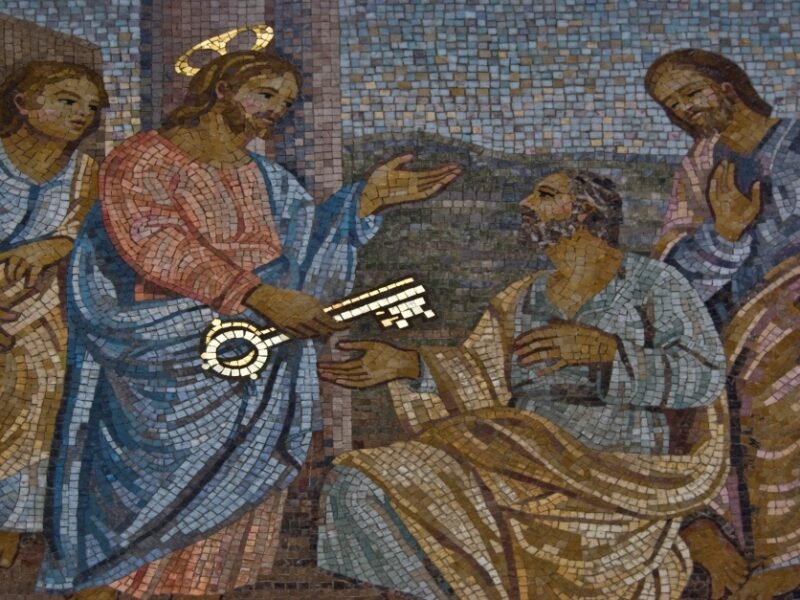Hannah King’s call to “make a start” for unity with the Episcopal Church of the United States invites a fresh response–and not the sort that rehashes the well known divisions between progressive and orthodox Anglicans. But as another young priest in the ACNA (and another Texan as it happens), I write out of concern for my fellows who also came to our Province after the tumults of the last decade, and I want to say two things: First, to make halting, even if only rhetorical, moves toward confraternity with TEC is to court dangerous confusion for those in our spiritual care. Second, that such moves denigrate the very real sacrifices our elders made and abdicates from the future of orthodox American Anglicanism that they made possible for us.
The subject of “scandal” in the Church has been sadly neglected, but it is more relevant today than ever to understand why The Apostles advised maintaining strict divisions over serious matters like sin or false teaching. When some sin or error is visibly and publicly tolerated by members of the body (especially clergy), it threatens the whole flock by incidentally encouraging others to imitate the error. The idea is that, even when teaching on a certain sin or doctrinal error is explicit, a practice of official toleration of that sin or error can make it seem as though the consequences of falling into it are not so very grave. To put a fine point on it: “creating networks that connect young leaders to any church ready to welcome faithful ministers” would cause just such a scandal, for if the doctrinal matters that divided the Episcopal Church from the new Anglican provinces were not serious enough to impede professional fellowships and official recommendations and co-laboring between the clergy, then the impression follows that they must not also be serious enough to impede any believer’s fellowship with Christ.
The very existence of the ACNA contradicts the ministry of TEC, and so the consistent and forthright position of any of any ACNA clergyperson would be to urge aspiring ministers not to attach themselves to that communion. Otherwise, what would the message be? Good for thee but not for me? This is just what the controversy of the last decade and a half was about: whether the false teaching and condoning of sin in the Episcopal Church endangers believers’ attachment to the Body of Christ. If it does not, then the division ought not to have happened in the first place and the ACNA ought not exist. If it does, then it would be a scandal to pretend to any sort of visible fellowship with the Episcopal Church. Perhaps I am not understanding what “networks” mean here, but if they be in any way public or visible, and involve any sort of official cross-pollination between our divided provinces, then they would of necessity be sources of scandal, and would need to be abandoned for the good of our flocks.
Nevertheless, Rev. King has decided that the 14 year distance between the schism of ‘04 opens an opportunity for Anglicans on both sides to reunite in some way around a desire for friendship, or at least a shared dislike of division. She seems to favor gatherings that heal by giving people the opportunity to “lament” publicly. But as a colleague, I earnestly and charitably urge Rev. King to listen carefully to the elder generation of orthodox American Anglicans on how these spaces are used against the cause of restoration of Truth. They can tell us, from firsthand experience, exactly “what it would look like for us to cultivate spaces where multiple (and opposing) perspectives on worldwide Anglicanism are represented.” These were the very spaces they evacuated: where promotion of the full gospel was muted and censored for the sake of sensitivity to others who happen to believe that the full gospel is bigoted and retrograde. This is salted soil in which nothing good can grow. “Shared lament” just like indaba and “walking together” are the sorts of substitutes for real Christian fellowship that effectively put out the concerns and perspectives of orthodox believers while still keeping them in the room. I am not speaking abstractly. I have it from those I know who left the Episcopalian Church that it was just these sorts of “sensitive” gatherings where giving voice to their own deeply held convictions of the danger of false teaching and their yearning for the true gospel got them labeled as mean, pharisaical, and “polarizing.”
It is easy to see why this is when you think about the relative positions of those involved in the controversy. When false teaching is at issue in the Church, it is those who find that fault who must give an account for it–and this necessarily means giving reasons, arguments. This necessarily puts oneself forward as “being right” (which is the nature of persuasion). On the other hand, those who are comfortable with the regime of false teachers have everything to gain from gauzy pronouncements that the Church must move beyond the polarities of “us and them” because it distracts from the matter at hand. For these latter: bad feeling, judgmentalism, and intolerance are causing division, but for the former, the rejection of Truth for error has already caused that division, and it needs to be brought to light in order to call fellows to repentance and communion with Christ. Since these two axes of disagreement share nothing like a common reference point. It would be like trying to talk after the fall of Babel. This is why we find no “safe space” recommended by the writings of the Apostle, as if truth and error could meaningfully coexist. Either one or the other will hold court. Unity only comes through repentance.
By listening to those who went through the schism, we can see why advancing the idea that God must not be all that interested in who is “right or wrong” about the identity and nature of his Body is not to extend the open hand of toleration but to give offense to our elders who put themselves on the line in order to remain connected to that Body. Ask any of them: it was not a concern for “being right” that caused the men, women, youth, and children to separate themselves from their ancestral congregations which–they assure me–had ceased to partake in Christ’s body, and instead given themselves over to become literal bodies of death. These acts were discerned through years of deep and careful prayer. Besides this, their decision to flee from false teaching, which in so many cases cost them property, friendships and reputations, ought to be honored by those of us in the next generation as the very sorts of sacrifices of praise and thanksgiving we all ought to hope to make of our own lives: pleasing and acceptable, worthy of being laid on our Altars.
I apply all familiar nuances and caveats to the above: that I do not deny that there are earnest orthodox believers still in TEC, that those in TEC who deny Biblical sexual teaching are, I’m sure, earnest folk of deep conviction, that orthodox Anglicans have been mean at times, that civil discourse is usually preferable to polemic, and all the rest. But even so much being said, we as clergy are still presented the same choice as those who went before us, to lead our flocks into worship in Spirit and Truth, or to fall back into old habits of approving of sin and error. In this, I will always follow my elders who have taught me the courage to dwell in apparent exile and to yearn only and at the expense of all lesser consolations for that city that has foundations, the pillar of the Truth.
Saint Athanasius, ora pro nobis.






'Respecting Our Elders' have 5 comments
November 12, 2019 @ 11:01 am Cynthia Erlandson
True and right, but for the irony of the author’s use of “clergyperson” rather than “clergyman.”
November 12, 2019 @ 9:19 pm Clay
@Cynthia – Astute observation!
November 12, 2019 @ 4:53 pm Jackson Waters
Fr. Wilgus, please take your own wise advice and heed the council of our elders, especially that written council, the XXII Article of Religion. Prayers to saints are neither catholic nor apostolic.
November 12, 2019 @ 8:57 pm (The Very Rev.) Robert S. Munday, PhD, DD
Thank you, Fr. Wilgus, for this response. I have to say that the Rev. Ms. King\’s article pained me more than anything I have read in a long time. It is a characteristic of the post-modern age to value relationships over truth, but I never thought I would see so blatant an example of this from a clergyperson in the Anglican Church in North America. Does Ms. King have no understanding of the issues that resulted in the ACNA separating from TEC? Does she think these things no longer matter? Yes, a great many people still in TEC may be nice people; we may be able to relate to them as friends; but ultimately they are in error and giving their lives to an institution that is devaluing God\’s Word and denying cardinal truths of the faith–truths that are essential for salvation. It is not hate or ill-will that caused the separation, but love–because heresy destroys souls, and our calling as faithful followers of Christ is to redeem lost souls by proclaiming the truth in love.
November 12, 2019 @ 11:17 pm Jim
Well said! Having entered into Christianity during the Jesus Movement where I first was exposed (at Church of The Resurrection, Dallas), to the convergence of the ancient, evangelical and charismatic, and having served several years in pastoral ministry after completing seminary in the early 80’s; I would simply say the following.
From the Ten Commandments to the clear Biblical teaching on human sexuality and the way to eternal life, God makes it clear to us how we should live in faith and conduct. God’s blessing and anointing rests on those individuals and organizations who seek with all their being to follow His Word. Individuals and organizations that choose to disavow or alter the clear teaching of His Word find themselves (by their own choice) separated from God. They may have a “form of godliness”, but they deny the true power and nature of God. They will fade into non-existence. Such is the trajectory of TEC. In 2004 as our church voted unanimously to leave TEC, I said to our Pastor, that God would raise up a place for His people to carry on His mission in the earth. Thank God for the ACNA and GAFCON.